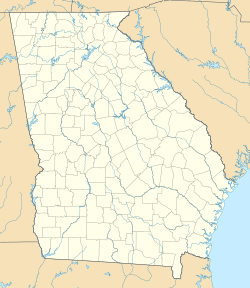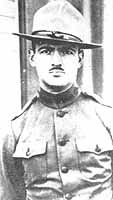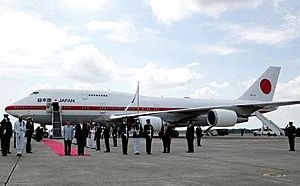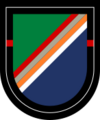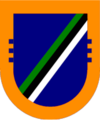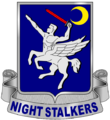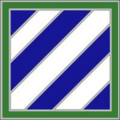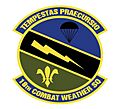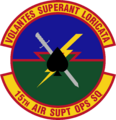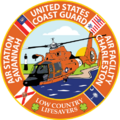Hunter Army Airfield facts for kids
Quick facts for kids
Hunter Army Airfield
  |
|||||||||||
|---|---|---|---|---|---|---|---|---|---|---|---|
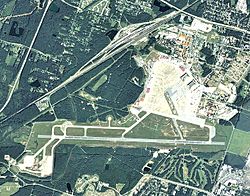
2006 USGS airphoto
|
|||||||||||
| Summary | |||||||||||
| Airport type | Military | ||||||||||
| Owner | United States Army |
||||||||||
| Serves | Fort Stewart | ||||||||||
| Location | Savannah, Georgia | ||||||||||
| Built | 1929 | ||||||||||
| In use | 1929 – present | ||||||||||
| Commander | Lt. Col. Bob Cuthbertson | ||||||||||
| Occupants | 3rd Infantry Division United States Coast Guard 1st Battalion, 75th Ranger Regiment (United States) 3rd Battalion, 160th Special Operations Aviation Regiment (United States) Landing Support Company, Combat Logistics Regiment 45 (United States Marine Corps) |
||||||||||
| Elevation AMSL | 42 ft / 12 m | ||||||||||
| Coordinates | 32°00′36″N 081°08′44″W / 32.01000°N 81.14556°W | ||||||||||
| Website | home.army.mil/stewart | ||||||||||
| Map | |||||||||||
| Runway | |||||||||||
|
|||||||||||
|
Source: Federal Aviation Administration
|
|||||||||||
Hunter Army Airfield (IATA: SVN, ICAO: KSVN, FAA LID: SVN) is a military airport in Savannah, Georgia, USA. It's a key part of Fort Stewart, which is a big Army base nearby.
This airfield has a really long runway, over 11,000 feet (about 3.4 kilometers)! It also has a huge area for parking aircraft. These features help the 3rd Infantry Division from Fort Stewart quickly send soldiers and supplies all over the world. Did you know that NASA even considered Hunter as a backup landing spot for the Space Shuttle?
Contents
Who Uses Hunter Army Airfield?
Hunter Army Airfield is home to about 5,500 soldiers, airmen, Coast Guardsmen, and Marines. It's especially important for the aviation (flying) units of the 3rd Infantry Division. Many other special units are also based here.
U.S. Army Units


 1st Battalion, 75th Ranger Regiment (United States): These are highly trained special operations soldiers.
1st Battalion, 75th Ranger Regiment (United States): These are highly trained special operations soldiers.

 3rd Battalion, 160th Special Operations Aviation Regiment (United States): Known as the "Night Stalkers," they fly helicopters for special missions, often at night.
3rd Battalion, 160th Special Operations Aviation Regiment (United States): Known as the "Night Stalkers," they fly helicopters for special missions, often at night. 3rd Infantry Division:
3rd Infantry Division:
- Combat Aviation Brigade (CAB) "Falcon": This brigade handles all the helicopters and planes for the 3rd Infantry Division.
- 2nd Battalion (General Support), 3rd Aviation Regiment: They fly UH-60 Black Hawk and CH-47 Chinook helicopters.
- 4th Battalion (Assault), 3rd Aviation Regiment: They also fly UH-60 Black Hawk helicopters.
 3rd Squadron, 17th Cavalry Regiment: They fly AH-64 Apache attack helicopters.
3rd Squadron, 17th Cavalry Regiment: They fly AH-64 Apache attack helicopters. 603rd Aviation Support Battalion (ASB): These units help keep the aircraft flying by providing maintenance and supplies.
603rd Aviation Support Battalion (ASB): These units help keep the aircraft flying by providing maintenance and supplies.
- Combat Aviation Brigade (CAB) "Falcon": This brigade handles all the helicopters and planes for the 3rd Infantry Division.
- 224th Military Intelligence Battalion (Aerial Exploitation): They gather information using aircraft.
- 260th Quartermaster Battalion: They handle supplies and logistics.
- 3rd MP Group (CID), United States Army Criminal Investigation Command: These are Army police and investigators.
Other Military Branches
- U.S. Air Force:
 Operating Location-A, Detachment 3, 18th Weather Squadron (USAF): They provide important weather information.
Operating Location-A, Detachment 3, 18th Weather Squadron (USAF): They provide important weather information.15th Air Support Operations Squadron (USAF): They help coordinate air support for ground troops.
 117th Air Control Squadron (USAF / Georgia Air National Guard): They control air traffic and monitor airspace.
117th Air Control Squadron (USAF / Georgia Air National Guard): They control air traffic and monitor airspace.
- U.S. Marine Corps:
- Landing Support Company, Combat Logistics Regiment 45 USMC: They help move equipment and supplies for the Marines.
Coast Guard Air Station Savannah
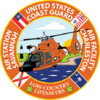 The Coast Guard Air Station Savannah is also located at Hunter Army Airfield. They use MH-65 Dolphin helicopters for important missions. Their main jobs include:
The Coast Guard Air Station Savannah is also located at Hunter Army Airfield. They use MH-65 Dolphin helicopters for important missions. Their main jobs include:
- Search and Rescue: They help people in trouble on the water, both near the coast and further out at sea.
- Security: They help protect our shores and borders.
A Look Back: Hunter Army Airfield's History
How it Began
In 1929, the city of Savannah decided to build a new airport. They chose a large piece of land and by September 1929, the airport was ready. It was first called Savannah Municipal Airport.
In 1931, it became part of a major airline route. A special ceremony was held, and the mayor's daughter christened an 18-passenger plane.
In May 1940, the airport was renamed Hunter Municipal Airfield. This was to honor Lt. Col. Frank O’Driscoll Hunter, who was from Savannah. He was a famous flying ace from World War I.
World War II and Beyond
In 1940, the United States Army Air Corps decided to build a military base at Hunter Municipal Airfield. It officially opened as Savannah Army Air Base in February 1941.
- Early Missions: The first unit stationed there was the 27th Bombardment Group. They flew B-18 Bolo bombers. Later, they were sent to the Philippines when World War II began.
- Anti-Submarine Patrols: In 1942, the base became important for patrolling the Atlantic coast. Planes from Savannah looked for and attacked German U-Boats (submarines).
- Training Base: Throughout the war, Savannah Army Air Base was a key training ground. Many bomber crews learned how to fly and fight here before going overseas.
- After the War: When the war ended, the base became a place where soldiers returned home and were officially released from service. In 1946, the airfield was given back to the city of Savannah. Some buildings were used for businesses, apartments, and even an orphanage. The University of Georgia also opened a campus there.
Hunter Air Force Base
In 1949, the United States Air Force needed a new base for its Strategic Air Command (SAC). Savannah offered to trade airfields, and in 1950, the base reopened as Hunter Air Force Base. It was named after Frank Hunter again, making it the only U.S. military base named after a living American at that time.
- Strategic Air Command Era: During the 1950s, Hunter Air Force Base was a very important SAC base. It was home to large bomber wings flying B-50 Superfortress and later B-47 Stratojet bombers. These planes were ready to respond if a war broke out.
- Accidental Bomb Drop: In 1958, a B-47 bomber accidentally dropped a practice bomb (without its nuclear part) near Florence, South Carolina. Luckily, it was not a real nuclear bomb, but it still caused damage and injuries.
- Air Defense Role: Hunter also played a role in air defense. From 1955 to 1979, it had radar stations that watched for unknown aircraft. This information was sent to a central system to help guide fighter jets.
Becoming Hunter Army Airfield
In 1964, the government announced that Hunter Air Force Base would close. However, during the Vietnam War, the Army needed more places to train helicopter pilots. So, in 1967, Hunter Air Force Base was given to the Army and became Hunter Army Airfield.
- Helicopter Training: Hunter became a major training center for Army helicopter pilots. It even had the first school for training pilots on the AH-1G Cobra, which was the world's first helicopter built specifically for attacking targets.
- Support for Fort Stewart: In 1973, Hunter Army Airfield was temporarily closed, but it reopened in 1975. Since then, it has been a vital support facility for the 24th Infantry Division (now the 3rd Infantry Division) at Fort Stewart.
- Key for Deployments: Hunter's long runway, along with Savannah's deep-water port and good roads, makes it easy for the Army to quickly send soldiers and equipment anywhere in the world.
- Ongoing Use: Even today, military jets and turboprop planes from other bases in Georgia, Florida, and South Carolina use Hunter's long runway for training.
Images for kids
 | Roy Wilkins |
 | John Lewis |
 | Linda Carol Brown |


